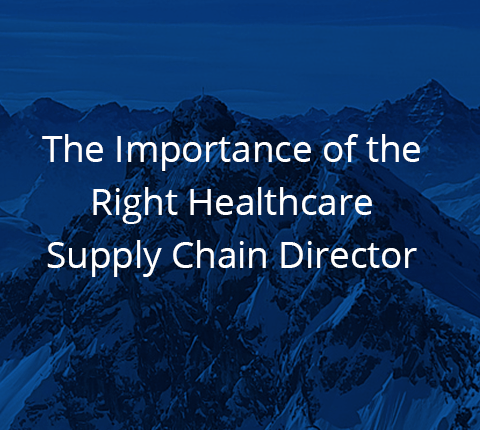The Importance of the Right Healthcare Supply Chain Director
Healthcare systems have been making the shift from a volume-based business model to a quality-based business model. As such, it is imperative to review all aspects of the revenue cycle in order to ensure profitability. The healthcare supply chain director has become more important than ever before since this role entails all areas of resource acquisition, tracking, and delivery of goods and services to the patient. The supply chain is incredibly elaborate since it deals with not just the healthcare system supplies, but also data management, and payments. Healthcare supply chain directors must also work alongside staff, doctors, insurance companies and regulatory agencies who may not always have the same goals in mind. These are just a few reasons why it is so important to place the right talent when filling a healthcare vacancy in the supply chain. This choice will impact the organization’s finances directly, as well as patient care and satisfaction.
The Importance of the Right Healthcare Supply Chain Director
Because this role deals directly with the organization’s finances, a supply chain director may be working with others who may have conflicting interests. For example, medical staff will be working towards getting as many supplies as possible to be ready whenever the need arises. At the same time, financial executives will set their sight on ameliorating overages in inventory and financial waste. The supply chain director must work to come up with solutions that will address the needs of both while making sure that hospital operations are not affected negatively by his or her decisions.
Supply chain directors are key figures in cutting costs for hospitals, physician practices, and healthcare organizations. This is especially true now that payers can link reimbursements to the performance of the organization. Healthcare supply chain directors can have a significant impact in this area of the revenue cycle. The supply chain deals with acquiring resources, managing them, and getting them to both doctors and patients. This means working with suppliers and manufacturers, insurance companies, internal staff, purchasing teams, and regulatory agencies. A strong supply chain director will promote productivity in the supply chain in order to yield reductions in costs across the organization.
How a Healthcare Supply Chain Director Can Reduce Unnecessary Spending
The supply chain director is in charge of making sure that the organization is properly stocked and with managing inventory. This may seem simple, but in truth, it is quite complex. The supply chain director balances relationships with suppliers, team members, and patients in order to ensure that patients receive the best care at the best value while keeping costs down for the organization. If a supply chain director can align the supply chain to the care delivery model, then he or she will be able to achieve this goal.
When purchasing supplies, the supply chain director works with one of two types of companies. They are either ordering inventory directly from the manufacturer or a distributor, or they are working as part of a group which will then work on behalf of the healthcare organization.
Once the inventory arrives, the items must be counted into stock and distributed properly so that each department has enough product to fulfill its needs and ensure the care and safety of its patients.
This leader must also work alongside regulatory agencies such as the FDA and healthcare payers in both vetting product and making sure that the provider is reimbursed at the end of the care cycle.
What makes this so incredibly complicated is that each participant in the cycle has his or her own goals to achieve. The supply producer or representative will push a product because it is the most profitable for their company. Executives at the healthcare organization need to keep an eye on costs while making sure patient satisfaction and safety goals are being met. Patients also affect the process. They may have specialized needs according to their health status and arrangements may have to be made according to their financial means.
Because each party has his or her own priorities that may not be in line with those of the healthcare organization, things can become complicated and bring about inefficiencies.
A strong supply chain director will focus on cost transparency by looking at price and usage data to track and manage inventory in a more efficient manner. This will also allow them to gather data that will lead to better purchasing decisions and deals with manufacturers. They should track products from the moment they leave the warehouse to the moment they are used on the patient. This way there can be a thorough analysis of demand and consumption so that these metrics can drive purchasing decisions. The result should be reduced waste, lower costs, and fewer variations in inventory so that product expiration is significantly reduced.
Another step an effective healthcare supply manager can take in order to achieve these goals is to work with information technology leaders to identify the best provider order and inventory systems to standardize and streamline processes throughout the organization.
Finally, supply chain directors must open chains of communication with executives in all departments, and even with clinical staff. A simple conversation can often result in cost-saving measures, reduce supply hoarding, and keep everyone outside of the direct supply chain focused on reducing and streamlining costs.
Finding & Attracting the Ideal Healthcare Supply Chain Director
If you are looking to place the right Healthcare Supply Chain Director, speak with our executive search team. Because we are a boutique firm, we take on a limited number of engagements. This means that our leadership team is devoted to your search. When you work with the Summit Talent Group team, you can be assured that search tasks are not delegated to less experienced team members. Our leaders will be with you each step of our proven 6-step executive recruitment process.
Our goal is to build a long-lasting relationship with your organization founded on trust and results. If you would like to speak with us about your executive search needs, contact us. We look forward to speaking with you.

Business Manager, Summit Talent Group

